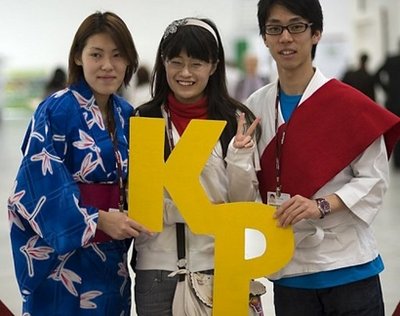Climate: Kyoto row rocks UN talks
The fate of the world's only treaty to spell out curbs in greenhouse gases buffeted the effort to revive the UN's campaign against global warming and its impacts.
"If countries park on extreme positions, then it's just not possible to come to a UN consensus," said EU chief negotiator Artur Runge-Metzger.
"That is certainly something that is like a sword of Damocles hanging over this conference."
 |
| Japanese youngsters, members of International Youth, attend a demonstration during the Hug Kyoto Day event demanding Japan to keep in the Kyoto Protocol in Mexico, on December 2. |
US Special Envoy for Climate Change Todd Stern said he saw "very sharp differences of opinion" over the Kyoto Protocol.
"It may be that the problems of Kyoto... tie this conference up, but I am very hopeful that it doesn't happen because I think it would be a huge mistake," he told journalists.
Stern was among the first senior envoys to arrive in Cancun ahead of a four-day minister-level haggle starting Tuesday under the UN Framework Convention on Climate Change (UNFCCC).
The talks entail two tracks of negotiations whose outcome would set down a post-2012 strategy for rolling back greenhouse gases and aiding poor countries exposed to climate change.
The two tracks are essentially interlinked, which explains why delegates fretted over a repeat of the logjam that drove last December's climate summit in Copenhagen to the brink of disaster.
One track gathers all 194 parties under the UNFCC, including the United States, while the other gathers the 193 parties to the Kyoto Protocol -- everyone but the United States.
Developing countries have said they will commit to a deal in the first track provided there is a deal in the second track for renewing commitments under the Protocol after the first roster of pledges expires at the end of 2012.
But on Monday, Japan bluntly gave notice it would refuse to sign up to a second commitment period.
There was "no sense" in renewing its pledges if the Protocol's cuts, applying just to rich economies, covered less than 30 percent of the world's emissions, it said.
Top carbon emitter China does not face these constraints as it is a developing country, while the United States, which is number 2, abandoned Kyoto in 2001.
On Friday, a group of left-wing Latin American countries warned an overall deal in Cancun would be "very difficult" without a Kyoto second commitment period.
The so-called ALBA group -- Bolivia, Cuba, Ecuador, Nicaragua and the Caribbean island nation of Dominica -- led hardline opposition at last year's summit to the Copenhagen Accord, a last-minute compromise cobbled together by a couple dozen leaders.
The European Union (EU) is Kyoto's biggest champion, but even so there are differences of opinion toward the treaty within the 27-nation bloc, a European diplomat said. Canada and Russia, meanwhile, are lukewarm or hostile to a second period if it does not include the world's biggest carbon polluters.
Scientists say unbridled burning of fossil fuels has brought concentrations of carbon dioxide, a colorless, odorless and tasteless greenhouse gas, to record concentrations.
Without urgent action to stem these emissions, the world is on track for worsening drought, floods, storms and rising seas, spelling a threat for hundreds of millions of people, they warn.
By 2030, climate change will indirectly cause nearly one million deaths a year and inflict 157 billion dollars in damage, according to estimates presented at UN talks.
A report found the biggest misery will be heaped on more than 50 of the world's poorest countries, but the United States will pay the highest economic bill.
"In less than 20 years, almost all countries in the world will realise high vulnerability to climate impact as the planet heats up," according to the study, compiled by a humanitarian research organisation and climate-vulnerable countries.
What the stars mean:
★ Poor ★ ★ Promising ★★★ Good ★★★★ Very good ★★★★★ Exceptional
Related Contents
Latest News
More News
- Russian President congratulates Vietnamese Party leader during phone talks (January 25, 2026 | 09:58)
- Worldwide congratulations underscore confidence in Vietnam’s 14th Party Congress (January 23, 2026 | 09:02)
- Political parties, organisations, int’l friends send congratulations to 14th National Party Congress (January 22, 2026 | 09:33)
- 14th National Party Congress: Japanese media highlight Vietnam’s growth targets (January 21, 2026 | 09:46)
- 14th National Party Congress: Driving force for Vietnam to continue renewal, innovation, breakthroughs (January 21, 2026 | 09:42)
- Vietnam remains spiritual support for progressive forces: Colombian party leader (January 21, 2026 | 08:00)
- Int'l media provides large coverage of 14th National Party Congress's first working day (January 20, 2026 | 09:09)
- Vietnamese firms win top honours at ASEAN Digital Awards (January 16, 2026 | 16:45)
- ASEAN Digital Ministers' Meeting opens in Hanoi (January 15, 2026 | 15:33)
- ASEAN economies move up the global chip value chain (December 09, 2025 | 13:32)

 Tag:
Tag:




















 Mobile Version
Mobile Version